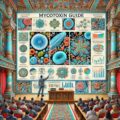Mycotoxin Illness Sabotages Protein Digestion
 Nearly a decade after I had recovered from my chronic illness, I started to notice strange symptoms. One of these was my inability to tolerate heavier foods and meat. At the same time, my daughter was having severe behavioral reactions when she ate meat. It was like she became a completely different child within an hour of eating it. I wondered why it was suddenly so hard for BOTH of us to break down proteins. With no other choice, we mainly went plant-based.
Nearly a decade after I had recovered from my chronic illness, I started to notice strange symptoms. One of these was my inability to tolerate heavier foods and meat. At the same time, my daughter was having severe behavioral reactions when she ate meat. It was like she became a completely different child within an hour of eating it. I wondered why it was suddenly so hard for BOTH of us to break down proteins. With no other choice, we mainly went plant-based.
Years later, once I finally healed from mycotoxin illness, I was able to see the big picture. The mycotoxins were sabotaging my ability to break down proteins, and there was nothing I could do about it until I eliminated exposure, fixed my gut, and used binders.
In this article, I will highlight my experiences with mycotoxin sensitivity and how it impacted my ability to digest proteins. Next, I will list several ways that mycotoxins can impair protein digestion and what that means to your health. Last, I will answer several common questions about mycotoxins and protein digestion. This is a CRITICAL topic for those battling with MCAS or other chronic illnesses. Scroll down to get started!
My Experiences with Mycotoxin Illness
I first learned about mycotoxin sensitivity after witnessing my daughter become disabled due to mold exposure. After eliminating exposure and detoxifying her body, she became symptom-free in six months. I thought she was completely cured of this condition because I had no understanding of mycotoxin sensitivity. I thought that the mycotoxins in her body were the thing that was making her sick, not her immune response to them.
After several months of being symptom-free for the first time in 7 years, I thought she was completely cured. With this belief in mind, I stayed with a friend in an old building I lived in when she was sick. I thought that maybe the mold was only in where I was living, not the entire building. Within four days of being there, many of her symptoms returned. Her eyes were crossing, her eczema flared up, she started slurring her speech, her face was flushing, and she was having behavioral issues.
This is when I realized her symptoms were being driven by an immune sensitivity to the mycotoxin. This epiphany was hard to accept, but it was critical to understand. It allowed me to treat the situation differently, and by doing so, I could prevent future flare-ups.
Undigested Proteins are Dangerous
During our recovery from mycotoxin illness, digestion was severely impaired. I would get muscle cramps/fatigue/skin tingling from eating animal protein, and my daughter would have significant behavioral shifts. In addition, she would complain about her feet hurting and itching all over. Eventually, I realized that protein wasn’t being digested well for either of us. Later, I learned that mycotoxins can impair protein digestion, and if you don’t understand this concept, you can self-sabotage very quickly. Now that we know these undigested proteins are dangerous, let’s understand more about why.
How Mycotoxins Impair Protein Digestion
Inflames the Gut Lining
When exposed to mycotoxins, the gut lining becomes significantly inflamed, impairing the digestion of heavier foods and complex proteins. This leads to a leaky gut, where protein molecules enter the bloodstream, triggering a system-wide inflammatory response. This compromises the production of digestive enzymes, further complicating the digestion of proteins. The only way to escape this is to implement a low-protein diet that is high in fiber and healthy carbohydrates. Once you eliminate exposure and remove the mycotoxins, you can start adding more protein.
Slows Down Pancreatic Function
Some mycotoxins, like trichothecenes, are known to block the production of proteases like trypsin and chymotrypsin. These enzymes are specifically designed to break down proteins. When levels of these enzymes are low, the undigested proteins sit there and rot, causing problems in the gut. Also, without proper levels of protease, you are unlikely to extract the amino acids from the protein. This makes you wonder if it’s even worth eating.
Inhibition of Protein Synthesis
Trichothecenes are potent inhibitors of ribosomal activity, which halts protein production in the body. When this occurs, it stops the natural production of healthy gut cells along the lining. This leads to a much higher chance of defective cells, increased inflammation, and a leaky gut. In this type of gut environment, protein digestion is very difficult.
Alteration of Gut Microbiota
Trichothecenes can disrupt the balance of gut bacteria by killing beneficial bacteria involved in breaking down proteins. Mycotoxins are also known to promote the growth of pathogens and harmful bacteria. This leads them to ferment the undigested meat, producing toxins like ammonia and gut-related symptoms.
Immune-Mediated Inflammation
Trichothecenes stimulate an overactive immune response in the gut, releasing inflammatory cytokines like IL-6 and TNF-alpha. This eventually leads to chronic inflammation of the intestinal walls, which reduces digestive efficiency. When inflammation levels are increased in the gut, your body struggles to digest proteins fully.
Neurological Effects on Gut Function
Trichothecenes can impact the nervous system, affecting gut motility and slowing digestion. This can lead to an incomplete breakdown of the meat, which causes a host of problems in the gut. When the meat rots in the gut, many toxins are released, which triggers inflammation and bacterial changes. All of these things impact the efficiency of protein digestion.
Reduction in Gastric Secretions
Some studies suggest trichothecenes can interfere with gastric acid production by affecting signaling pathways in the stomach. Since gastric acid is crucial for the initial breakdown of meat, its reduction can significantly impair digestion.
Decreases Nutrient Absorption
Mycotoxins can significantly damage the intestinal villi, the tiny structures along the intestinal lining responsible for absorbing nutrients. When these are damaged, it is extremely hard to absorb the amino acids from the food. The reality is, amino acids are the main benefit of consuming anything with protein. If you are not getting them, it’s not worth the downsides.
Triggers Mast Cell Activation
Mycotoxins can aggravate the mast cells in the gut, causing them to release histamine and other inflammatory molecules after every meal. This creates an unhealthy environment in the gut that compromises protein assimilation. With the immune system reacting to nearly everything you eat, it reduces the likelihood of extracting nutrients, especially amino acids.
Overloads the Liver/Kidneys
Mycotoxins significantly impair the liver’s function. They also compromise phase 1 and phase 2 detoxification, making it even harder to metabolize amino acids. Since the liver is already bogged down with so many toxins and struggling to keep up, the last thing it needs is to deal with amino acids. This metabolism of amino acids requires a lot of effort by the liver, so you don’t want to consume dense protein sources until it is functioning well again.
FAQ- Mycotoxin Illness and Protein Digestion
Can mycotoxins be there if I see no mold in my house?
Yes, absolutely! I lived in several places where I could never see mold, but my daughter was still getting extremely sick. Also, you can get a negative mold test result, but there are still high levels of mycotoxins. For example, stachybotrys mycotoxins are typically found in 300-fold greater amounts versus spores.
This is a common misunderstanding that keeps people confused when they are trying to overcome mycotoxin illness. Mycotoxins can penetrate porous surfaces like wood and drywall. Unless these things are removed, mycotoxin exposure can persist, even after mold has been “remediated”.
What mycotoxin impairs protein digestion the most?
Trichothecenes are toxins produced by certain molds like Stachybotrys and Fusarium. These are the most dangerous mycotoxins for various reasons. Not only does it suppress normal immune function, but it inhibits protein digestion and production. Unfortunately, most people with mycotoxin illness do not know this, so they continue to consume animal products multiple times per day. This leads them to have a leaky gut, a backed-up detox system, and a host of other problems because of it.
To resolve this issue, you want to emphasize plant-based foods high in fiber. The goal is to transition your diet from one emphasizing protein/fat to fiber and carbohydrates. This will reduce the likelihood of undigested proteins, improving your gut and overall symptoms. For a list of the best foods for your immune system, read my article – The Hypoallergenic Food List. It focuses on foods with the simplest protein structures, which makes them the easiest to digest and least likely to cause a reaction.
Why is undigested protein so bad for mycotoxin illness?
When meat or animal products are undigested, they create ammonia and other harmful toxins in the gut . This causes inflammation in the gut lining, which increases the likelihood of leaky gut. It also encourages the growth of pathogenic bacteria and suppresses the replication of beneficial organisms like Bifidobacterium.
In addition, when proteins are undigested, the toxic byproducts must be processed by the liver and kidneys. This causes significant stress on the detoxification channels. By forcing the liver and kidneys to perform this function, you dramatically slow down their normal operation. This is why it is so important to implement a low-protein diet when recovering from mycotoxin illness.
Can I overcome mycotoxin illness while eating a high protein diet?
If you move from a place that contains mycotoxins, then yes, you can overcome many of the symptoms of mycotoxin illness. The problem is that you will still have mycotoxins in your body, impairing your protein digestion. To restore digestive capabilities, you must use mycotoxin binders to eliminate the residual toxins.
Your digestive function should normalize within a few months of eliminating the mycotoxins. When this occurs, you should still stick with your dietary changes. Eating a diet that is low in animal products is actually quite healthy for you. Do yourself a favor, and stick with it the best you can, even when you no longer have to. Trust me, your body will thank you years from now.
What diet is best for overcoming mycotoxin sensitivity?
A plant-based diet is the best choice for people suffering from mycotoxin illness. Plant fiber helps detoxify the body and feed beneficial bacteria. These bacteria eliminate mycotoxins and keep the immune system calm by producing short-chain fatty acids.
Also, reducing the amount of animal products in the diet reduces the stress on the detox system. This is critical if you want to remove the mycotoxins and support your detoxification channels. I have seen plenty of people who can’t overcome mycotoxin illness until they significantly reduce their intake of animal products. I was one of them, my daughter was, and many of my clients were as well. The reality is mycotoxins like trichothecenes are so toxic they REALLY can impair the digestive system. If you don’t make adjustments, you WILL pay the consequences.
Conclusion- Improve Mycotoxin Illness with Low-Protein Diet
When you have mycotoxin illness, you must prioritize your symptoms over everything. This includes your dietary preferences, living situation, and daily routine. For me, it was a harsh realization when I finally understood what I had to do to overcome mold illness. When I finally made the changes, I saw significant benefits. After experiencing success with my strategy, I applied the same concept to my daughter and clients. From there, I knew I had something special to help people battling mold illness.
If you have any questions about mycotoxin sensitivity, get in touch. I’m willing to help and blessed to have the opportunity!
Happy healing everyone!
Matt Nedin
Certified Holistic Nutritionist
EndSickness – Founder
Phone: (734) 846-8619
Email: endsickness@gmail.com
WhatsApp- +17348468619












